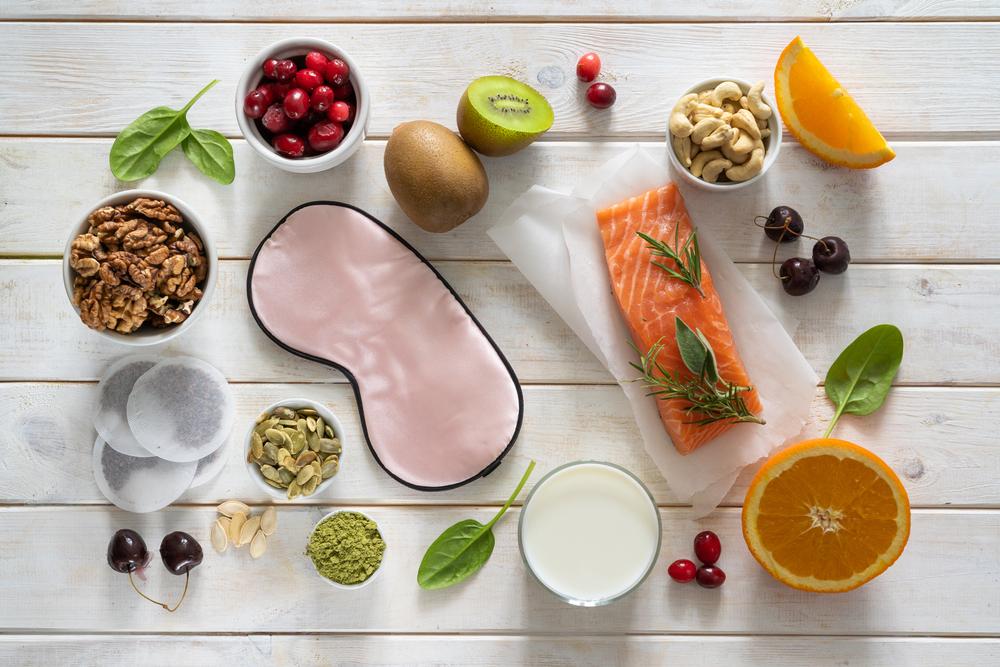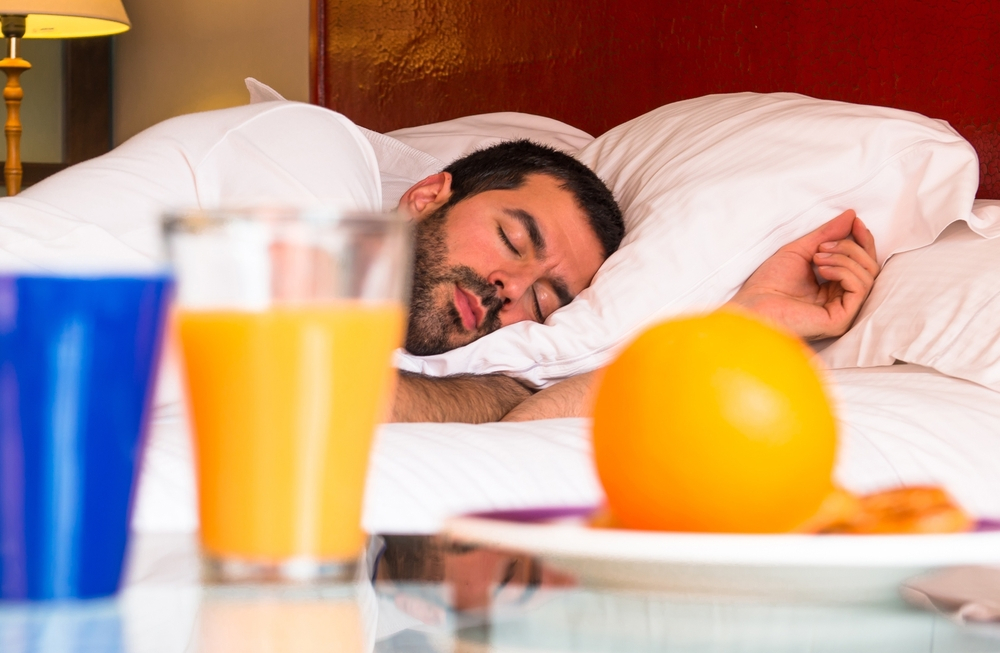Sleep and Nutrition: A Holistic Guide to Better Rest

Table of Contents
Discover the essential connection between sleep and nutrition, and how they can work together to optimize your rest and rejuvenation. In this holistic guide, we’ll explore the intricate relationship between sleep quality and dietary choices, uncovering the keys to achieving better rest naturally.
Understanding the Sleep and Nutrition Connection

Did you know that the food you eat can seriously affect how well you snooze at night? It’s true! Just like a puzzle where every piece fits perfectly, your body needs a balanced diet to help you get quality sleep. On the flip side, a good night’s rest can also influence the food choices you make the next day. Let’s take a look at how this two-way street works to keep you feeling your best.
How Sleep Affects Nutrition
When we’re talking about catching some Z’s, it’s not just about feeling rested. Sleep has a powerful impact on what you eat and how your body handles food. Think about when you’re low on sleep; you might notice you’re reaching for snacks more often. That’s because lack of sleep can mess with the hormones that control hunger—ghrelin and leptin. Ghrelin tells you when you’re hungry, and when you’re tired, your body makes more of it. Leptin is like the food police; it lets you know when to stop eating. But when you’re short on shuteye, leptin levels drop, and that means you’re more likely to keep munching.
Lack of sleep can also lead to less-than-stellar food choices. When you’re tired, your body craves energy-dense, high-carb foods to get a quick energy boost. So, not getting enough rest can set off a chain reaction: you’re hungrier, your hormone balance is out of whack, and you’re more likely to go for those chips instead of an apple. Making sure you get enough sleep is one of the best things you can do to keep your nutrition on track.
How Nutrition Affects Sleep
Ever wonder why you toss and turn some nights, while on others, you’re out like a light as soon as your head hits the pillow? What you eat might be the secret behind those zzz’s. Just like a puzzle, your body needs the right pieces to complete the sleep picture. The foods we munch on can encourage – or disturb – those precious hours of shut-eye.
Imagine your stomach as a control center for snooze signals. Some foods are like little helpers that tell your body, “*Hey, it’s time to wind down.*” They pack nutrients that boost a brain chemical called serotonin, which calms you down. Other eats can be party crashers, making you too energized or uncomfortable for sleep.
Keep it simple, and remember, the path to dreamland might just start on your plate!
Dietary Strategies for Improved Sleep

When it comes to catching those much-needed Z’s, what you eat is just as important as your bedtime routine. Imagine filling your plate with foods that hug you into a cozy slumber! We’re about to dive into which tasty choices can lead you to dreamland, and which ones might keep you counting sheep all night. So, get ready to take notes for your next grocery run – your journey to better sleep through your diet starts now!
Foods that Promote Better Sleep
Eating the right thing before bedtime can be like a direct ticket to dreamland. It’s not about noshing on anything at hand; some foods are like a lullaby for the body. Cherries, for instance, naturally contain melatonin, the hormone that helps control your sleep cycle, and munching on them can give you a nudge towards a night of quality snooze.
When it’s late and you’ve got sleep on the brain, reach for a banana. These yellow crescents are not just tasty, they’re packed with potassium and magnesium, which double as natural muscle relaxants. Plus, the vitamin B6 that you find in bananas is a co-pilot in producing serotonin, a relaxer for the brain. Add some almonds to the mix, as they’re another provider of melatonin, and you’ve got yourself a bedtime snack that’s got sleep written all over it.
Foods to Avoid for Quality Rest
When it comes to catching those much-needed Z’s, what you eat can make a big difference. Your diet doesn’t just fuel your body; it also affects how well you snooze at night. Certain foods could be the culprits behind those restless nights.
For starters, it’s wise to steer clear of caffeine late in the day. That mid-afternoon espresso might seem necessary at the time, but caffeine can linger in your system for hours, keeping you wired when you want to wind down. Another sneaky sleep snatcher is chocolate. Yes, it’s delicious, but chocolate also contains caffeine, particularly dark chocolate, which can disturb your slumber if you indulge too close to bedtime.
Next up on the list are spicy foods. While they might be packed with flavor, they’re infamous for causing heartburn or indigestion. Nobody wants to be up all night with a fiery sensation in their chest!
Don’t forget about high-fat foods. Burgers, fries, and other greasy temptations can take a while to digest and might lead to discomfort when you’re trying to get some shuteye. Similarly, heavy or rich meals right before bed may overload your digestive system, which interferes with your ability to drift off.
Lastly, alcohol might seem like a sleep aid thanks to its sedative effects, but it actually messes with your sleep cycle later in the night. So, that nightcap is more of an enemy than a friend to your rest.
By avoiding these food and drink pitfalls, you’re setting the stage for a night of uninterrupted sleep. Remember, what you put on your plate in the evening can have a big impact on the quality of your night’s rest.
Lifestyle Habits for Better Sleep

Improving your rest is about more than what you eat; it’s also about what you do. Our daily routines play a massive role in how well we snooze at night. Let’s dive into some key lifestyle habits that could help you catch those z’s with ease. By tweaking a few activities during your day, you could be on your way to dreamland without counting a single sheep.
Physical Activity and Sleep
Getting your body moving during the day can make a huge difference when it’s time to hit the hay. Exercise, especially when it’s done regularly, has a powerful impact on sleep quality. It’s not just about tiring yourself out; physical activity actually helps to regulate your sleep-wake cycle, also known as your circadian rhythm.
But here’s the catch – timing is everything. Working up a sweat too close to bedtime can leave you too energized to fall asleep. So aim for an exercise sweet spot earlier in the day. This gives your body the signal that it’s time to be awake and active, and later, to settle down and recover. After all, your bed should be a place of rest, not a finish line!
Creating a Sleep-Enhancing Environment
Transforming your bedroom into a calm oasis could be a game-changer for your slumber routine. Think of your sleeping area as a sanctuary, free from the chaos of the outside world. Start by dialing down the noise, which means turning off TVs, smartphones, and any other gadgets that can disrupt the peace. White noise machines or earplugs can be lifesavers if total silence isn’t an option.
Then, focus on dimming the lights. Our bodies are wired to respond to light, waking up when it’s bright and winding down when it’s dark. Use heavy curtains or blackout shades to keep your room cave-like and ready for rest. And temperature? It’s key! Keep your sleeping space slightly cool – around 65-68 degrees Fahrenheit – because a cool room can help you doze off faster and stay asleep longer. Your cozy, serene bedroom is not just a dream; it’s your ticket to dreamland!
The Role of Supplements in Sleep Optimization

Sometimes, even the best diet might need a little extra help. That’s where supplements come into play—they can be that nudge your body needs to slip into dreamland. While they’re not magic pills, they should complement a lifestyle that already fosters good sleep. Let’s dive into some go-to supplements that might just be your ticket to a night of deeper, more satisfying sleep. Remember though, it’s always best to check with a healthcare professional before adding any new supplement to your routine.
Melatonin and Its Benefits
Melatonin isn’t just a supplement; it’s a super-helper when it comes to snoozing! Your body already makes melatonin naturally—it’s like your internal clock telling you when it’s time to hit the hay. But, guess what? Sometimes our bodies need a little nudge, and that’s where melatonin supplements swoop in to save the night.
Taking melatonin can be a game-changer, especially if you’re tossing and turning with your thoughts on a never-ending loop. It can help you fall asleep faster and might even boost the quality of your Z’s. Plus, for the jet-setters out there, it’s pretty nifty at kicking jet lag to the curb. Just remember, even though melatonin is awesome, it’s best to chat with a doctor before diving into any new supplement routine.
Other Key Sleep-Inducing Supplements
While melatonin often steals the spotlight for sleep support, there are other supplements that can lend a hand for a night of quality z’s. Take magnesium, for instance; this mineral helps quiet the mind and body, making it easier to fall asleep. Studies suggest that magnesium’s role in supporting deep sleep is due to its ability to maintain healthy levels of GABA, a neurotransmitter that promotes sleep.
Another powerhouse in the sleep game is valerian root. It’s been used for centuries to combat insomnia, anxiety, and restlessness. Valerian appears to increase the levels of another chemical messenger, serotonin, which works to calm your nerves and make sleep more inviting. Just like any supplement, it’s a good idea to chat with a healthcare professional before starting, to make sure it’s right for you.
Mind-Body Practices for Restful Sleep

Unlock the door to dreamland with the power of your mind! The strong connection between our mental state and how well we sleep is often overlooked. But, don’t worry, we are here to shine a light on some super-effective mind-body techniques that quiet those noisy thoughts and ease you into a night of peaceful slumber. Let’s dive into how relaxation exercises, and a mindful approach at bedtime, can transform tossing and turning into restful z’s.
Relaxation Techniques for Bedtime
Trying to get to sleep can sometimes feel like trying to tame a bunch of jumping thoughts inside your head. But, guess what? There are some super cool tricks that can help you calm down and get ready for some awesome zzz’s. Relaxation techniques at bedtime aren’t just a way to chill out – they’re a secret weapon for snoozing success.
One of the coolest tricks to try is deep breathing. It’s like taking your body on a chill-out vacation. Just lay back, take a deep breath in, hold it for a sec, and then let it out slow. Do this a few times and you’ll feel the day’s stress deflate like a beach ball. Plus, ever heard of progressive muscle relaxation? It’s like giving your muscles a goodnight hug. Starting from your toes to your head, tense up each muscle for a few seconds then let it go. It’s like telling every part of your body, “Hey, it’s time to hit the hay!”
The Impact of Mindfulness and Meditation
Meditation and mindfulness are like superheroes for your sleep! They swoop in to rescue your mind from the buzz of daily life. Picture this: you’re lying in bed, and all those worries, to-do lists, and random thoughts are dancing around in your head. It’s super frustrating, right? Well, mindfulness is all about focusing on the here and now. It’s like telling your brain, “Hey, let’s chill and just focus on breathing for now.”
Meditation is a step up. It trains your brain to find peace and quiet. Imagine every breath you take as a soft whisper, saying, “Relax, everything’s going to be alright.” Studies show that when you make meditation a habit, you’re basically giving your brain a high-five. It helps you manage stress, which is a massive deal when it comes to quality zzz’s. So, give your brain a break with some mindfulness before bed, and watch how it invites sweet dreams and restful nights.
Conclusion
By recognizing the profound interplay between sleep and nutrition, we can implement a holistic approach to enhance our rest and overall well-being. Embracing the fusion of dietary adjustments, lifestyle changes, and mindful practices can pave the way to experiencing deeper, more rejuvenating sleep. Start applying these insights today and awaken to a revitalized state of physical and mental balance, fueled by the seamless harmony of sleep and nutrition.
FAQs
- How does sleep impact nutritional choices?
- Lack of sleep can affect hormones that regulate hunger and satiety, leading to increased cravings for unhealthy foods. Understanding this connection helps individuals make informed choices about their diet and overall health.
- What foods can enhance sleep quality?
- Certain foods contain sleep-promoting substances, such as tryptophan and melatonin. Exploring a diet rich in these nutrients, like incorporating turkey, nuts, and cherries, can positively influence sleep patterns.
- Are there specific nutrients or supplements that aid in better sleep?
- Exploring the role of nutrients like magnesium, vitamin D, and melatonin supplements can be beneficial for those struggling with sleep issues. Understanding the appropriate use and potential benefits of these supplements is important for overall sleep optimization.
- How does physical activity contribute to better sleep?
- Regular physical activity has been linked to improved sleep quality, but the timing and intensity of exercise can play a role. Understanding the relationship between physical activity and sleep can guide individuals in establishing effective sleep-enhancing routines.
- What lifestyle habits can negatively impact sleep?
- Certain lifestyle habits, such as excessive caffeine intake, irregular sleep schedules, and screen time before bedtime, can disrupt sleep patterns. Recognizing and addressing these habits is essential for creating a conducive environment for quality rest.
useful resources
- National Sleep Foundation – Sleep and Nutrition
- The National Sleep Foundation offers insights into the relationship between sleep and nutrition, providing tips and information on how dietary choices can impact sleep quality.
- Harvard Health Publishing – Sleep and Eating: What’s the Connection?
- This article from Harvard Health Publishing explores the bidirectional relationship between sleep and eating, offering evidence-based insights and practical advice for improving both.
- Sleep.org – Food and Sleep: What to Eat for a Good Night’s Sleep
- Sleep.org, the official website of the National Sleep Foundation, provides a guide on what to eat for a good night’s sleep, including information on specific foods and their impact on sleep.
- Mayo Clinic – Sleep and Nutrition: What to Eat for Better Sleep
- Mayo Clinic offers expert answers to frequently asked questions about the relationship between sleep and nutrition, including advice on dietary choices for better sleep.








I don’t think the title of your article matches the content lol. Just kidding, mainly because I had some doubts after reading the article.
Your article helped me a lot, is there any more related content? Thanks!